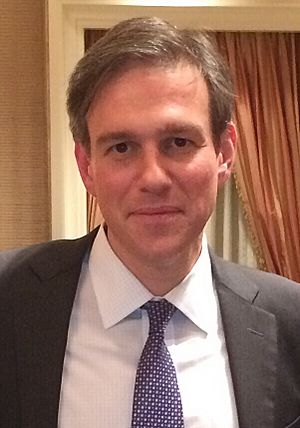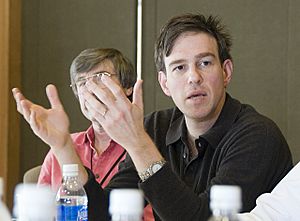Bret Stephens facts for kids
Quick facts for kids
Bret Stephens
|
|
|---|---|

Stephens in 2015
|
|
| Born |
Bret Louis Stephens
November 21, 1973 New York City, U.S.
|
| Education | |
| Occupation |
|
| Years active | 1995–present |
| Spouse(s) |
Pamela Paul
(m. 1998, divorced)
|
Bret Louis Stephens (born November 21, 1973) is an American journalist and writer. He is known for writing opinion columns, which are articles that share a writer's personal views. Since 2017, he has written for The New York Times and appeared on NBC News. He also became the first editor-in-chief of SAPIR: A Journal of Jewish Conversations in 2021.
Before joining The New York Times, Stephens was a foreign affairs columnist and an editor at The Wall Street Journal. He also worked as the editor-in-chief of The Jerusalem Post from 2002 to 2004. In 2013, he won the Pulitzer Prize for Commentary for his writing at the Wall Street Journal.
Stephens is known for his views on international relations and for being a critic of Donald Trump.
Contents
Early Life and Education
Bret Stephens was born in New York City. His parents, Xenia and Charles J. Stephens, were both from Jewish families. His mother was born in Italy during World War II. His paternal grandfather, Louis Ehrlich, came to New York from a place called Kishinev (now Chișinău, Moldova) after a difficult event there. He changed the family name to Stephens.
Louis Stephens later moved to Mexico City and started a business. Bret's parents moved to Mexico City with him when he was a baby to help with the family business. Bret grew up there and can speak Spanish very well. When he was a teenager, he went to a boarding school in Massachusetts.
Stephens went to college at the University of Chicago. He also earned a degree in comparative politics from the London School of Economics.
Personal Life
Bret Stephens is married to Corinna da Fonseca-Wollheim, who is a music critic for The New York Times. They have three children and live in New York City. He was previously married to Pamela Paul.
Journalism Career
Stephens started his career in journalism in 1995 at Commentary magazine.
In 1998, he began working at The Wall Street Journal as an editor for opinion pieces. He also worked for The Wall Street Journal Europe in Brussels, where he edited a weekly column about the European Union.
In 2002, Stephens moved to Israel to become the editor-in-chief of The Jerusalem Post. He was 28 years old at the time. Some people at the newspaper were surprised that a non-Israeli was appointed to this role.
Stephens left The Jerusalem Post in 2004 and returned to The Wall Street Journal. In 2006, he started writing the "Global View" column for the newspaper.
In 2017, Stephens left the Journal and became an opinion columnist for The New York Times. He also started appearing on NBC News and MSNBC as a commentator.
In 2021, Stephens became the editor-in-chief of SAPIR: A Journal of Jewish Conversations.
Awards and Recognition
In 2005, the World Economic Forum recognized Stephens as a Young Global Leader. He won the Eric Breindel Award for Excellence in Opinion Journalism in 2008. In 2010, he received the Bastiat Prize.
Stephens won the 2013 Pulitzer Prize for Commentary. This award recognized his insightful articles about American foreign policy and politics, which often presented a different point of view. He has also served as a judge for other Pulitzer Prize categories.
In 2023, Stephens gave a speech at the University of Chicago. Some student groups expressed concerns about his views on Israel.
Published Works
Stephens has written several books. His book America in Retreat: The New Isolationism and the Coming Global Disorder was published in November 2014. In this book, he suggests that if the United States steps back from its role in global affairs, it could lead to more problems around the world.
Political Views
Foreign Policy
Foreign policy is a main topic in Stephens's columns. He is known for his views that suggest using military strength to promote democracy, especially in the Middle East.
Stephens supported the start of the 2003 Iraq War. He believed that Iraq might become a nuclear power if not stopped. He also strongly disagreed with the Iran nuclear deal, which aimed to limit Iran's nuclear program.
Israel
Stephens is a strong supporter of Israel. He believes that Western media sometimes misunderstands Israel's situation. He has stated that he does not see Israel as the aggressor in conflicts. When he led The Jerusalem Post, he guided the newspaper to a more supportive stance towards Israel. He has also said that he does not consider Israeli communities in the West Bank to be illegal, even though some international laws say otherwise.
He has supported Israel during the Gaza war. He has also strongly criticized groups like the Houthis, Hezbollah, and Hamas for their violent actions against Israel. He believes Hamas is responsible for the ongoing conflict.
Stephens wrote an article for The New York Times calling South Africa's genocide case against Israel a "moral obscenity." He argued that quotes from Israeli officials were misunderstood. He also pointed to the 1988 Hamas charter to claim that Hamas is an organization that aims to harm others. He accused Hamas of using civilians as shields.
Global Warming
Stephens has been known for his different views on climate change. He has been described as someone who questions climate change, but he says he is "agnostic" about it, meaning he is not sure.
He has called climate change a "mass hysteria phenomenon" and has questioned if greenhouse-gas emissions are a threat. He has suggested that climate change discussions are more about belief than science. He has also said that climate change activism is like "hysterical alarmism" and distracts from other important issues.
As of October 2022, Stephens has said that he now accepts that human activities are causing climate change. He came to this understanding after a trip to Greenland with a climate scientist. However, he believes that markets, rather than governments, are better at solving the problem.
Gun Rights
Stephens has different views on gun rights compared to many conservatives. He has suggested changing the Second Amendment to the United States Constitution, which protects the right to own guns. However, he does not support a complete ban on gun ownership.
Donald Trump
During the 2016 United States presidential election, Stephens was a strong critic of Donald Trump. He wrote many articles opposing Trump's campaign. He even compared Trump to an Italian leader from the past, Benito Mussolini.
After Trump was elected, Stephens continued to oppose him. In 2017, he spoke at a lecture and criticized Trump's attacks on the media. In 2018, he argued that Trump should be impeached, using the same reasons Republicans had used to try to impeach Bill Clinton.
After the 2024 United States presidential election, Stephens wrote an article in The New York Times. He acknowledged his past criticisms of Trump. He suggested that people, including those who criticized Trump, should wish the new administration well. He also suggested giving some of Trump's cabinet choices the benefit of the doubt. He advised against making extreme comparisons to past dictators and to focus on real problems rather than fears.
Published Works
- America in Retreat: The New Isolationism and the Coming Global Disorder (November 2014)
- Has Obama Made the World a More Dangerous Place? The Munk Debate on U.S. Foreign Policy (August 2015)
- The Dying Art of Disagreement (December 2017)


